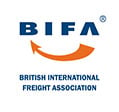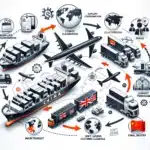
Milky Way Logistics: Export Licensing Guide
Key Aspects of Export Licensing in the UK
Export licensing is a critical aspect of international trade, ensuring that the movement of goods across borders complies with national and international regulations. In the UK, the export licensing system is designed to regulate the export of controlled goods, including military items, dual-use goods, and technology that could have both civilian and military applications. This article provides an in-depth look at the export licensing process in the UK, outlining key requirements, types of licenses, and the steps involved in obtaining an export license.
Understanding Export Control
Export controls are legal measures to prevent the proliferation of materials, technology, and knowledge that could contribute to the development of weapons of mass destruction or be used for military purposes. They are also used to enforce international sanctions and embargoes. The UK’s export control regime is governed by the Export Control Act 2002 and the Export Control Order 2008, which align with international agreements such as the Wassenaar Arrangement, the Nuclear Suppliers Group, and the Australia Group.
Types of Export Licenses
The UK government issues several types of export licenses, each catering to different types of goods and export destinations. The primary licenses include:
- Standard Individual Export Licenses (SIELs):
- Purpose: Authorize the export of specified goods to a specific destination and end-user.
- Validity: Usually valid for two years.
- Application: Suitable for companies exporting high-value or sensitive items.
- Open Individual Export Licenses (OIELs):
- Purpose: Allow multiple shipments of specified goods to multiple destinations.
- Validity: Typically valid for five years.
- Application: Best for businesses with regular, ongoing export activities.
- Open General Export Licenses (OGELs):
- Purpose: Permit the export of specified goods to a range of destinations without the need for individual applications.
- Validity: Indefinite, but subject to compliance with the terms and conditions.
- Application: Suitable for less sensitive items and widely traded goods.
- Transshipment Licenses:
- Purpose: Required for goods passing through the UK en route to another country.
- Application: Necessary when goods are being temporarily stored or transferred through the UK.
Key Considerations for Export Licensing
When applying for an export license, businesses must consider several critical factors:
- Nature of the Goods:
- Determine if the items are listed as controlled goods under the UK Strategic Export Control Lists. These include military goods, dual-use items, and certain technology and software.
- End-Use and End-User:
- Assess the intended use of the goods and the profile of the end-user. Licenses may be denied if there is a risk of misuse or diversion to undesirable end-users.
- Destination Country:
- Review the destination country’s status regarding embargoes, sanctions, or other restrictions. Some countries have stricter controls due to political or security considerations.
- Compliance with International Obligations:
- Ensure that the export complies with international treaties and agreements, such as the Arms Trade Treaty and the Chemical Weapons Convention.
The Licensing Process
The export licensing process in the UK involves several steps:
- Preliminary Assessment:
- Identify whether the goods require a license by consulting the UK Strategic Export Control Lists and using online tools such as the Goods Checker and OGEL Checker.
- Application Submission:
- Submit the license application through the SPIRE (Export Control Joint Unit’s online licensing system). Provide detailed information about the goods, end-use, end-user, and destination.
- Review and Evaluation:
- The Export Control Joint Unit (ECJU) reviews the application, assessing risks associated with the export. This may involve consultation with other government departments and international partners.
- Decision and Issuance:
- The ECJU issues a decision, which may include conditions or limitations. If approved, the license is granted, and the exporter must comply with all terms and conditions.
- Compliance and Record-Keeping:
- Maintain records of all export transactions and comply with reporting requirements. Ensure ongoing compliance with license conditions and update the ECJU with any significant changes.
Conclusion
Navigating the export licensing landscape in the UK requires a thorough understanding of the regulations, careful planning, and diligent compliance. By securing the appropriate licenses, UK businesses can ensure their international trade activities are legal, ethical, and contribute to global security and stability. Whether you are exporting cutting-edge technology, military equipment, or dual-use items, staying informed and compliant is essential for successful international trade.
Milky Way Logistics offers expert consultation and comprehensive services to streamline your export process. For further information, please contact us.






